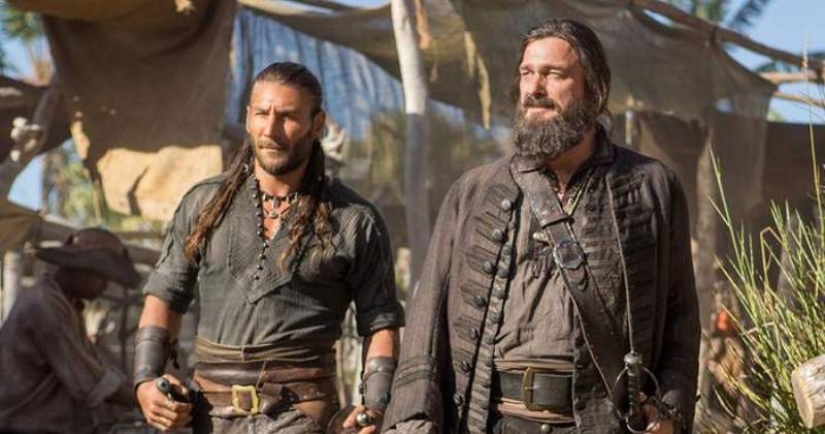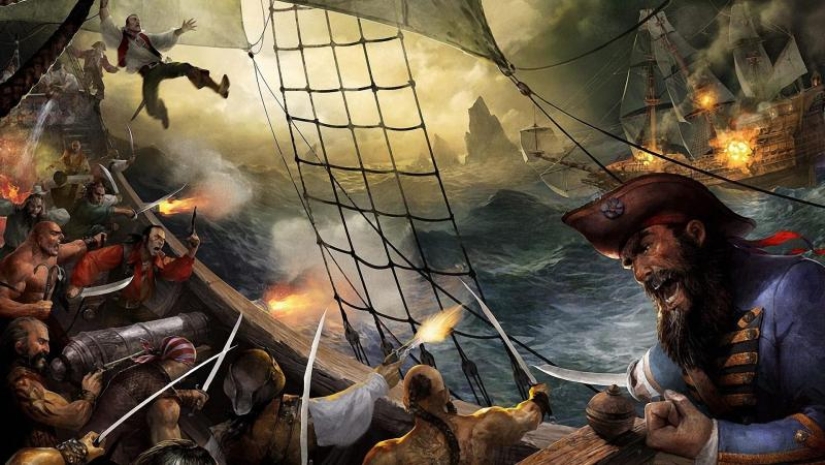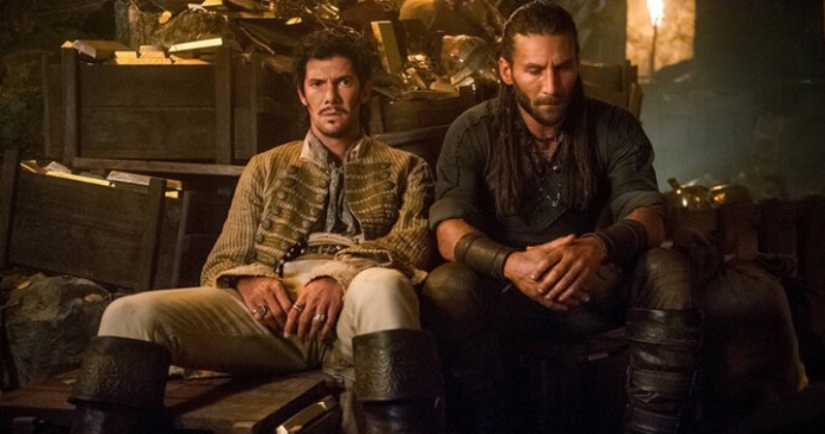Pirate Love, or same-sex marriage under the " Jolly Roger»
Categories: History
By Pictolic https://pictolic.com/article/pirate-love-or-same-sex-marriage-under-the-jolly-roger.htmlWe are sure that we know a lot about pirates. They drink rum, carry a parrot on their shoulders, creak a wooden leg, and rob sea vessels. Someone can also boast of deeper knowledge and even tell you how corsairs differ from filibusters. But almost no one knows how the sea robbers, who had to stay away from the coast for months, arranged their personal lives. Meanwhile, the pirate society in the 17th and 18th centuries was the most tolerant and relaxed.

The pirate's life was constantly in danger. The "gentleman of fortune" could die at the hands of the enemy, as a result of a shipwreck, from a tropical disease, in a daring stabbing with fellow soldiers or on the gallows. Therefore, most of these guys are used to living one day and did not limit themselves too much in their passions.

In the 17th and 18th centuries, both in the Old and New World, homosexuals were treated extremely negatively. The same-sex relationship was considered ungodly and unnatural, and the" sodomite "and" sodomite " were threatened with censure, imprisonment and even the death penalty.
But it is important to clarify that even in those days, some people were a little more equal than others before the law and the church, so same-sex love was associated, first of all, with the aristocracy, which spat on prohibitions and could buy off any charges. Well, at sea, the only authority was the captain, and if he had nothing against romances between his subordinates, then they did not waste time.
This state of affairs jarred the "land rats". Most eloquent of all about the attitude to the sea freemen is a letter from the Reverend John Flavel to the merchant John Lovering: "To mortify their passions is the surest way to revive your trade." It is clear from this that Father John was convinced that the love affairs of sailors did not affect discipline in the best way.

But on ships that plied the seas and oceans for many months, women were not welcome, so, most often, the harsh sailors found an outlet in the "male friendship". In the navy and merchant navy, lovers from the crew had to hide, but in the pirate environment, homosexuality was not considered something terrible or unnatural.
People who live a free life and do not look back at the laws and prejudices, always calmly look at someone else's personal life and prefer not to judge anyone. So it was in the Cossack villages, and so it was on the pirate schooners and brigantines. This tolerance led to the emergence of an interesting custom, which was called "matelotage". In fact, it was a same-sex marriage, and with serious obligations between partners.
The word "matelotage" comes from the French "sailor", from which the English "mate" was later born – a friend, a partner. It meant a marriage union between two sailors, which in the 17-18 centuries was not only romantic, but also socio-economic in nature.

The two pirates, bound by the matelotage contract, maintained a common household, if it could be so called in the conditions of the ship, and also owned property together. In the event of the death of one of the men, the second automatically inherited all his savings and property. The pirate captains respected this custom and made sure that it was followed.
In 1666, a gang of filibusters, Francois Olone, stormed the Spanish port city of Maracaibo, located in what is now Venezuela. During the battle, many desperate guys died and the captain personally made sure that the "spouses" honestly received a share of their dead roommates.
At the same time, matelotage was not mandatory – only those pirates who were satisfied with all the criteria entered into this same-sex marriage. In such a union, most often one partner was much older. It also happened that under the "blue" guardianship fell and teenagers who got into the pirate team in search of adventure and profit.

The conclusion of the marriage contract between the two pirates was celebrated as a significant event. Often there was a ceremony, which involved the exchange of rings and oaths of allegiance. The captains were no different in this respect from the members of their team and also often got themselves matelots. The famous pirate captain Robert Culliford was married to a young man named John Swan, with whom he shared his cabin.
On shore, the Matelots ' relationship remained as strong as ever. The island of Tortuga, which became a center of piracy in the Caribbean, was so saturated with male romanticism that the French governor of the region in 1645 brought a large group of prostitutes there to distract the sea wolves from same-sex love.
The official naively believed that the whole thing was due to the lack of female society, but soon became convinced that one thing is not a hindrance to the other. Matelots were happy to visit prostitutes, while maintaining their strong male union, proven in the seas and battle. There were also times when real tropical passions boiled among the sea robbers, with accusations of infidelity and murders motivated by jealousy.

This had to be dealt with, for example, in the same way as the famous pirate leader Bartholomew Roberts. Tired of the "family squabbles" on the ships of his pirate fleet, the captain equated boys with women and, on pain of death, forbade bringing on board young men who were not in the crew.
Keywords: Sea | Pirates | Caribbean | History | Navy | Gay | Homosexuality
Post News ArticleRecent articles

It's high time to admit that this whole hipster idea has gone too far. The concept has become so popular that even restaurants have ...

There is a perception that people only use 10% of their brain potential. But the heroes of our review, apparently, found a way to ...
Related articles

Everyone knows the names of travelers since the Great geographical discoveries. What about those who are not so lucky, who did not ...

The sea is still, you are a woman or a man, if you can hold in their hands an army of 70,000. Chinese Chin si could — she started ...

The depths of the sea pose a lot of interesting things. Photographer from Australia dives into the depths of the amazing underwater ...

New Year's is a time to surprise and delight loved ones not only with gifts but also with a unique presentation of the holiday ...